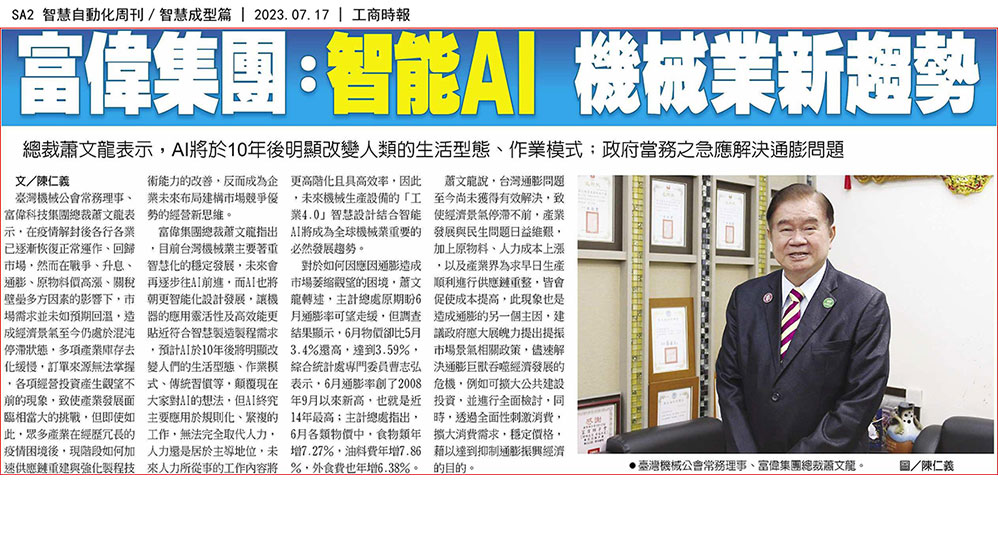Forwell: Let’s Talk about the Trend of AI Smart Machinery Industry
2023/07/17
Written by Chen Renyi

Taiwan Machinery Association's Executive Director and President of Forwell Group, Mr. Hsiao Wen-long, mentioned that after the lifting of pandemic restrictions, various industries have gradually resumed normal operations and returned to the market organism. However, the market demand has not picked up as expected due to some factors such as wars, interest rate hikes, inflation, soaring raw material prices, and multiple tariff barriers. The economy is still in a state of uncertainty and stagnation, leading to slow inventory clearance in many industries and uncertainty in the sources of orders. This has resulted in businesses adopting a wait-and-see approach in their investment decisions, presenting significant challenges for industry development. Despite these challenges, many industries, having endured the prolonged pandemic situation, now focus on accelerating supply chain rebuilding and enhancing process technology capabilities to create a new business mindset for future market competition environment.
President Hsiao of Forwell Group pointed out that the current focus of Taiwan's machinery industry is on the stable development of intelligence, and in the future, there will be a gradual move towards AI development. Artificial intelligence will also advance towards more intelligent designs, making machine applications more flexible and efficient to meet the needs of smart manufacturing processes. It is predicted that AI will significantly change people's lifestyles, work patterns, and traditional habits in the next 10 years, challenging existing perceptions of AI. However, AI will mainly be applied to rule-based and complex tasks and cannot fully replace human labor. Human labor will remain in a dominant position, with future work content becoming more advanced and efficient. Consequently, the combination of "Industry 4.0" intelligent design in machinery production equipment, along with intelligent AI integration, is expected to become a significant and inevitable trend in the global machinery industry.
Regarding how to respond to the difficult situation of market contraction and cautiousness caused by inflation, President Hsiao relayed that originally, the Directorate-General of Budget, Accounting and Statistics (DGBAS) had hoped for a slowdown in inflation rate in June. However, the survey results showed that the June prices were even higher than May, reaching 3.59%, compared to the previous month's 3.4%. Cao Zhi-hong (曹志弘), a specialist committee member at the DGBAS, stated that the June inflation rate reached the highest level since September 2008, making it the highest in nearly 14 years. According to the DGBAS, among various categories of prices in June, food prices increased by 7.27% year-on-year, fuel and lubricant expenses increased by 7.86% year-on-year, and dining out costs increased by 6.38% year-on-year.
President Hsiao stated that the inflation issue in Taiwan has not been effectively resolved, leading to stagnant economic growth and increasing challenges for both industrial development and people's livelihoods. The rises in raw material and labor costs, as well as the need for supply chain restructuring to ensure smooth production in the industry, have all contributed to higher costs, which is another major factor causing inflation. Hsiao suggested that the government should show boldness in proposing policies to boost market conditions and promptly address the crisis of inflation undermining economic development. For example, the government could expand public infrastructure investment and conduct a comprehensive review. Additionally, through comprehensive stimulus measures to boost consumer demand and stabilize prices, the goal of curbing inflation and revitalizing the economy could be achieved.


